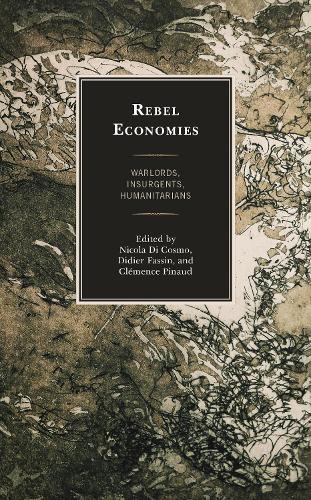
Rebel Economies: Warlords, Insurgents, Humanitarians
(Hardback)
Publishing Details
Rebel Economies: Warlords, Insurgents, Humanitarians
By (Author) Nicola Di Cosmo
Edited by Didier Fassin
Edited by Clmence Pinaud
Contributions by Jonathan Benthall
Contributions by William Caferro
Contributions by Gilles Carbonnier
Contributions by Nicola Di Cosmo
Contributions by Christopher Cramer
Contributions by Didier Fassin
Contributions by Philippe Le Billon
Bloomsbury Publishing PLC
Lexington Books
18th May 2021
United States
Classifications
Professional and Scholarly
Non Fiction
Political science and theory
International relations
330.9
Physical Properties
Hardback
290
Width 163mm, Height 228mm, Spine 27mm
612g
Description
As a pervasive occurrence in the contemporary world, wars and their economic sources are defining social and political processes in a variety of national and transnational contexts. Rebel Economies: Warlords, Insurgents, Humanitarians explores historical, anthropological and political dimensions of war economies by non-state actors across different periods and regions, while presenting their multiple manifestations as a unified, congruent phenomenon. Through a variety of conceptual and disciplinary approaches, the authors investigate, in the past and present and across three continents, the nexuses between economy, war, social transformation and state-building, revealing in the process differences and similarities that would otherwise remain hidden. Through this broad-gauge approach, the book aims, first, to rethink much of the debate around non-state war economies, and, secondly, to expand the conversation by consciously treating this theme as a conspicuous and distinct aspect of both economy and war. This is not just a different approach but a fundamental departure from the ways in which current discussions over the economy of wars, civil conflicts, and revolutions, have informed research orientations over several decades.
Reviews
This is a fascinating and important addition to our understanding of war economies. Much of the literature tends to focus on how wars are financed and the impact of conflict on the local economy. Rebel Economies expands the scope to include how rebels organize economic life with multiple aims, including resource extraction for war and profit, and uses their own ideas of good governance to organize economic life. In other words, rebel economies resemble state economies but without the state. The subject alone makes the book unusual and well-worth engaging, and the individual chapters are fascinating and highly rewarding.
-- Michael Barnett, George Washington UniversityRebel Economies: Warlords, Insurgents, Humanitarians is a rich, empirically-based analysis of similarities and differences in non-state war economies within superficially incommensurate contexts of space and time, viewed from a range of disciplinary perspectives. Among its many striking insights are the often incomplete separation of state and non-state actors, and the prevalence of complex networks of stakeholders in which local and global interests increasingly are intertwined.
-- Joanna Waley-Cohen, NYU ShanghaiAuthor Bio
Nicola Di Cosmo is the Henry Luce Foundation Professor of east Asian Studies at the Institute for Advanced Study
Didier Fassin is the James D. Wolfensohn Professor at the Institute for Advanced Study, director of studies at the cole des Hautes tudes en Sciences Sociales, and annual chair of public ealth at the Collge de France.
Clmence Pinaud is assistant professor at the department of international studies of Indiana University, Bloomington.
